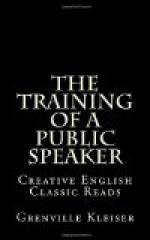THE USE OF PERIODS
The period is proper for the exordiums of greater causes, where the matter requires solicitude, commendation, pity. Also in common places and in every sort of amplification; but if you accuse, it ought to be close and compact; if you praise, it should be full, round, and flowing. It is likewise of good service in perorations, and may be used without restriction wherever the composition requires to be set off in a somewhat grand and noble manner, and when the judge not only has a thorough knowledge of the matter before him, but is also captivated with the beauty of the discourse and, trusting to the orator, allows himself to be led away by the sense of pleasure.
History does not so much stand in need of a periodical flow of words, as it likes to move around in a sort of perpetual circle, for all its members are connected with each other, by its slipping and gliding along from one subject to the next, just as men, strengthening their pace, hold and are held, by grasping each other by the hand. Whatever belongs to the demonstrative kind has freer and more flowing numbers. The judicial and deliberative, being varied in their matter, occasionally require a different form of composition.
FITTING EXPRESSION TO THOUGHT
Who doubts that some things are to be exprest in a gentle way, others with more heat, others sublimely, others contentiously, and others gravely? Feet composed of long syllables best suit grave, sublime, and ornamental subjects. The grave will take up a longer space in the pronunciation, and the sublime and ornamental will demand a clear and sonorous expression. Feet of short syllables are more agreeable in arguments, division, raillery, and whatever partakes of the nature of ordinary conversation.
The composition of the exordium will differ, therefore, as the subject may require. For the mind of the judge is not always the same, so that, according to the time and circumstances, we must declare our mournful plight, appear modest, tart, grave, insinuating; move to mercy and exhort to diligence. As the nature of these is different, so their composition must be conducted in a different way.
Let it be in some measure a general observation that the composition ought to be modeled on the manner of pronunciation. In exordiums are we not most commonly modest, except when in a cause of accusation we strive to irritate the minds of the judges? Are we not copious and explicit in narration; in arguments animated and lively, even showing animation in our actions; in common places and descriptions, exuberant and lavish of ornaments; and in perorations, for the most part weighed down by distress? Of the variety which ought to be in a discourse, we may find another parallel instance in the motions of the body. With all of them, do not the circumstances regulate




